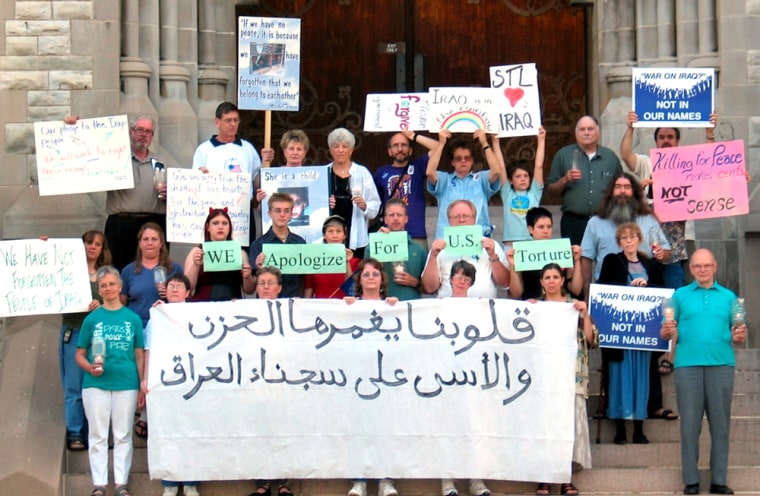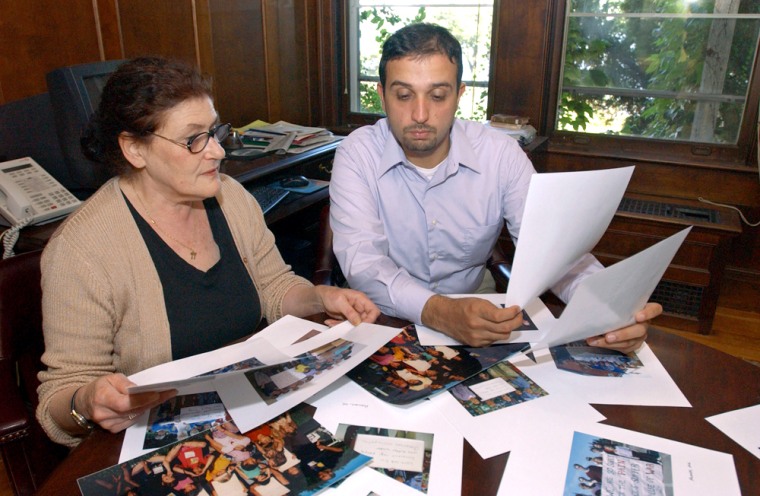More than 2,000 people opposing the war in Iraq, including the father of an American beheaded by terrorists, are sending Iraqis personal photos with protest messages to show “what Americans are really like.”
The pictures, from all around the country, are meant to be a counterpoint to the infamous images of Americans abusing Iraqi prisoners. Each photo shows at least one sign, usually handmade. Some specifically criticize U.S. actions in the war while others simply extend sympathy to Iraqi civilians.
“With deep shame, we apologize for the suffering our country has brought to the people of Iraq,” says a banner in a photo showing 11 people in Vancouver, Wash. Three elderly people in Minneapolis declare, “All our children long for a new day.”
Michael Berg, whose son Nicholas was executed last spring by an al-Qaida-affiliated group, holds a sign in his photo that says, “I am sorry and ashamed for the tremendous loss my government has caused the Iraqi people.”
“I truly feel that what the United States government has done to the once-sovereign nation of Iraq is atrocious and shameful,” he said in a phone interview. Berg, whose opposition to the war predates his son’s execution, will be in Washington on Wednesday when the project is formally unveiled by the Fellowship of Reconciliation.
Undercutting U.S. troops?
The peace group, which organized the project, said it wants Iraqis to know that most Americans were shocked by the photos of U.S. soldiers abusing Iraqis prisoners and many regret a war being waged in their name.
A veterans’ group, however, believes the project undercuts U.S. soldiers.
Jerry Newberry, spokesman for the Veterans of Foreign Wars, said, “This type of thing only serves to undermine the effort and the sacrifice of our military in Iraq. These people on the face of it seem to have a political agenda. ... It implies that what we’re attempting to do in Iraq is shameful.”

The White House had no comment, spokesman Ken Lisaius said.
The project was sparked by Kaia Svien, a 57-year-old Minneapolis teacher, who said she was “just dumbstruck” when she saw the Abu Ghraib prison photos.
“It was the power of the photographs that brought home the message,” Svien said. “So I thought, ’Can’t we use photos in another way to respond to this and hope they will be as powerful? Maybe we can show them what Americans are really like.”’
She took the idea to the Nyack-based Fellowship, a 90-year-old group with a history of pacifism and activism. Staffer Hossein Alizadeh made it a national project, asking local peace groups to spread the word.
Speaking as 'ordinary Americans'
About 400 pictures came in from more than 100 cities and towns. Half of them are being burned onto CDs for distribution Wednesday to news media that reach Iraqis, said Fellowship spokeswoman Jennifer Hyman.
“We thought it would be great if we could speak as ordinary Americans to ordinary Iraqis,” said Alizadeh. “Since the United States went in there, the Iraqis have seen nothing but violence, so they have a very negative opinion of Americans. We hope that after they see these photographs, they will pause for a second and think, ’At least we have a few friends, there are people who care about what’s happening.”’
He said that despite the signs in the pictures, the project is “not about condemning any government.” Hyman said the peace group wants to stop the deaths of U.S. soldiers as well as Iraqis.
There is no official figure for the number of Iraqis killed, but some non-governmental estimates range from 10,000 to 30,000. As of Friday, 1,086 members of the U.S. military have died since the beginning of the Iraq war in March 2003, according to the Defense Department.
'We're not their enemies'
Bruce Hawkins of Northampton, Mass., a retired physics professor who sent in a photo of 16 people in a Quaker meeting house, said, “The intent was to send a friendly message to people. We’re not their enemies and they’re not ours.”
The sign in his photo says, in part: “We pray for the humane treatment of all prisoners and the continuing healing of human hearts.”
A group of 27 people stood for their portrait on the steps of St. Francis Xavier College Church in St. Louis after their weekly anti-war vigil. One of their signs says, in Arabic, “Our hearts are full of pain and sorrow for the Iraqi prisoners.”
William Quick, a lawyer from Lincoln Heights, Mo., who took the picture, said the church was used as the background to show that “being Christian does not mean being anti-Muslim.”
Mimi Pukuma, 29, of Philadelphia, posed with three friends and a sign that says, “We apologize from our hearts for the suffering our government is causing innocent Iraqi people.”
“I’ve been writing letters to the government, going to anti-war vigils and so on but that’s impersonal in many ways,” she said. “This seemed like I could in some small way express my sadness to Iraqi citizens.”
